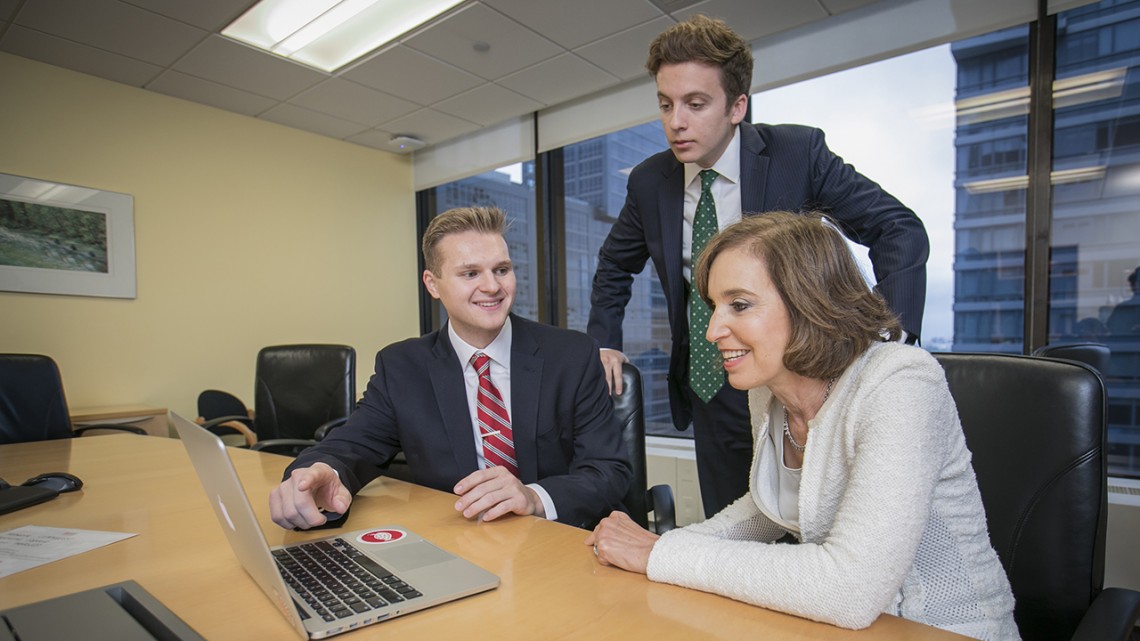
From left, ILR students Nick Martin ’19 and Chris Rogers ’19 work with Barbara Bookman, of the City University of New York, to research the feasibility of expanding services aimed at improving employment outcomes for students with autism.
ILR interns explore ways autistic students can move from college to work
By Hilary Roberts Grant
Chris Rogers ’19 and Nick Martin ’19 worked this summer as interns on a concept designed to improve supports for young adult autistic students at the City University of New York transition more smoothly from college to the world of work.
They spent eight weeks in collaboration with CUNY leadership, researching the feasibility of expanding CUNY services for neurodiverse students to create a “neurodiversity hub” model focused on improving employment outcomes for students with autism. The model Rogers and Martin proposed offered students mentorship opportunities, training programs and employer workshops.
Rogers and Martin worked with the Borough of Manhattan Community College, Brooklyn College, College of Staten Island, Kingsborough Community College and LaGuardia Community College on each school’s REACH (Resources and Education on Autism) program. In 2014, the Centers for Disease Control estimated one in 59 children were diagnosed with autism spectrum disorder.
“CUNY is remarkable because of the immense support systems it already had in place,” Martin said. However, “it also made sense to explore the extended services a "Hub" model proposes since colleges have students with Autism searching for employment.”
Rogers and Martin provided CUNY with an analysis identifying challenges a hub might face, and the merits of keeping a program afloat. The students traveled to every New York borough to interview university personnel, and autistic students and their parents. The interns also spoke to potential employers.
“We wanted to learn what they, as employers, wanted to gain from the hub. Also, what were they willing to contribute to a hub? Were they willing to provide training, job opportunities and mentoring?” Rogers said.
Both students took part in related for-credit ILR internships in spring 2018, Rogers at DXC Technologies in Melbourne, Australia, where he helped pilot a similar neurodiversity hub for the Swinburne University of Technology and Martin at Microsoft headquarters in Seattle.
“One important thing I learned in Melbourne is to not forget that the primary focus is providing students with support in all aspects of their college education,” Rogers said. “That means not just academics and career search, but students’ physical and mental health.”
At Microsoft, Martin worked in the daily operations of a three-year-old program for employees with autism spectrum disorders, and with the company’s Autism at Work Summit in April.
“Working at Microsoft helped me see what policies and practices are successful within companies,” he said. “It also gave me the chance to work on the employer end of the hiring equation.”
At the end of their internships, Rogers and Martin submitted a report outlining their research findings. CUNY asked them if a hub could work. “We think it can,” Martin said.
Rogers and Martin’s internships were facilitated by Susanne Bruyère, director of the ILR School’s K. Lisa Yang and Hock E. Tan Institute on Employment and Disability and professor of disability studies; she created a series of internships for ILR students interested in human resources to learn more about business-driven Autism at Work programs.
“The focus of these internships is to assist students in learning directly from the companies about employment processes leading to successful programs for employees with autism,” Bruyère said.
Media Contact
Get Cornell news delivered right to your inbox.
Subscribe
